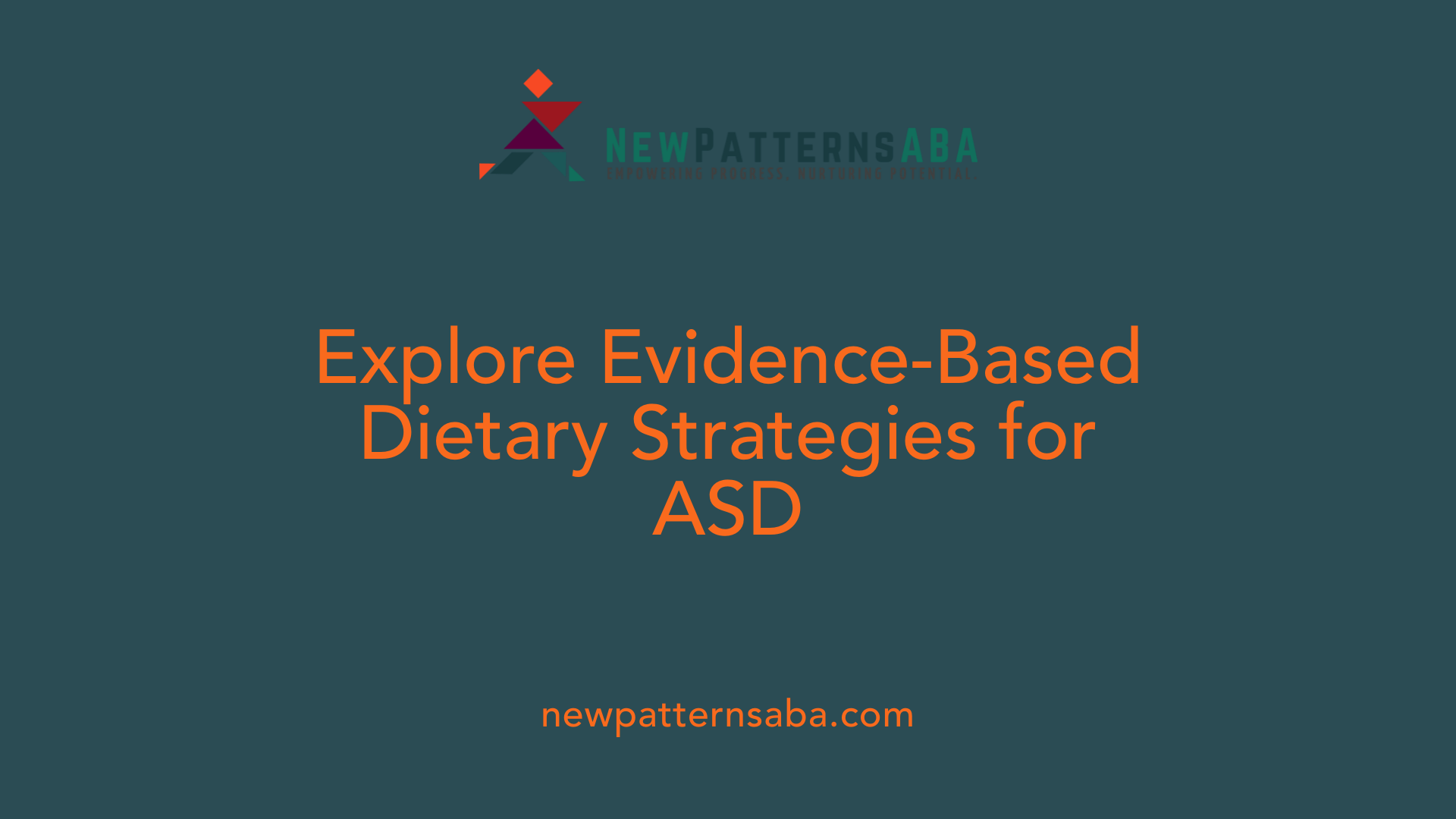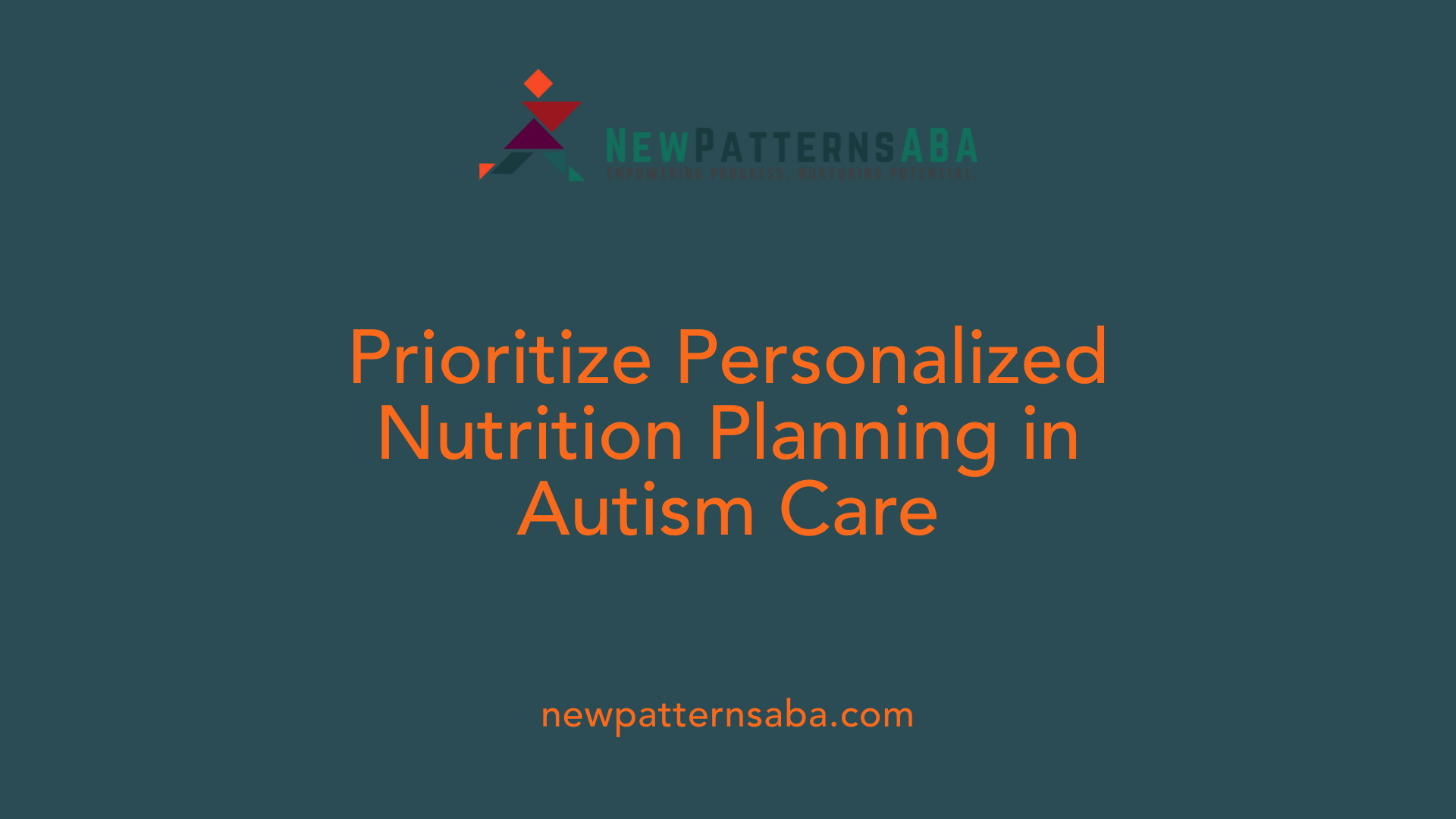Addressing Nutritional Challenges in Autism Spectrum Disorder
Children with Autism Spectrum Disorder (ASD) frequently encounter significant nutritional and eating challenges that can directly impact their health and the effectiveness of behavioral therapies such as Applied Behavior Analysis (ABA). This article explores these challenges, dietary considerations, and interventions that can be integrated into personalized care plans to support both nutritional adequacy and developmental outcomes.
Understanding Mealtime Challenges and Their Nutritional Impact

What are common mealtime challenges in children with autism and their impact on nutrition?
Children with autism spectrum disorder (ASD) face mealtime challenges five times more frequently than their peers. These challenges include tantrums, extreme food selectivity, and ritualistic eating behaviors. Such difficulties often result in inadequate nutrition, especially a low intake of critical nutrients like calcium and protein which support bone strength, growth, brain development, and overall health.
Common eating behaviors and food selectivity
Autistic children often exhibit restricted eating patterns, refusing certain foods or sticking to a very limited range. This food selectivity is frequently linked to sensory sensitivities regarding texture, smell, or appearance, and can lead to an unbalanced diet. Rituals around eating can also restrict dietary variety further, complicating nutritional adequacy.
Nutritional deficiencies common in ASD
Due to these eating patterns, children with autism often show deficiencies particularly in calcium and protein, essential for healthy development. These deficits increase risks of weaker bones, slowed growth, and impaired cognitive development.
Causes of feeding difficulties including sensory and gastroenterological factors
Feeding challenges in ASD arise from a combination of factors. Sensory sensitivities cause aversions to certain food textures or tastes. Gastrointestinal issues such as constipation or abdominal pain are common and may exacerbate feeding difficulties. Additionally, restricted or repetitive behaviors characteristic of autism can make children resistant to changes in their diet or mealtime environment.
Addressing these mealtime challenges with a personalized approach is crucial to improving nutrition and supporting overall health in autistic children.
Applying Applied Behavior Analysis (ABA) Therapy to Mealtime and Nutritional Issues

What is Applied Behavior Analysis (ABA) therapy and how does it help individuals with autism?
Applied Behavior Analysis (ABA) therapy is a scientifically supported approach that uses evidence-based strategies to improve behaviors and skills in individuals with autism. It focuses on teaching communication, social skills, self-care, and academic abilities through individualized programs developed by trained professionals. ABA employs techniques like positive reinforcement and analyzing the ABCs (Antecedent, Behavior, Consequence) to encourage desirable behaviors and reduce harmful ones. Often delivered in homes, schools, or communities, ABA is tailored to each person's unique needs and goals. Early intensive ABA intervention can produce significant developmental gains.
ABA strategies applied to feeding difficulties
ABA therapy addresses feeding challenges common in children with autism, such as food selectivity, refusal, and tantrums during mealtime. Techniques like gradual exposure introduce new foods slowly to reduce anxiety or sensory aversions. Positive reinforcement rewards acceptance of targeted foods, increasing the likelihood of repeated positive behavior. Structured routines and visual schedules help establish predictable mealtime environments, reducing stress and ritualistic behaviors associated with eating.
Role of behavioral interventions in improving food acceptance
Behavioral interventions within ABA therapy are effective in increasing food variety and reducing problematic mealtime behaviors. Using systematic desensitization, therapists help children tolerate new textures and tastes, while shaping procedures reinforce small steps towards accepting different foods. This approach is often combined with parental training to support consistent strategies at home, fostering improvements in nutritional intake.
How ABA and nutritional management intersect
Nutrition assessment is integral to managing feeding issues in children with autism. ABA therapy can complement dietary plans by addressing behavioral barriers to adequate nutrition. A multidisciplinary approach, involving dietitians and therapists, ensures tailored interventions that meet both sensory and nutritional needs. Through coordinated efforts, ABA supports behavioral change that facilitates acceptance of necessary nutrients, which can improve overall health and enhance outcomes from behavioral therapies.
Dietary Modifications and Nutritional Interventions in ASD

What dietary interventions are used in managing autism-related nutritional challenges?
Children with autism spectrum disorder (ASD) frequently face mealtime difficulties like extreme food selectivity and gastrointestinal issues, impacting their nutritional status. To address these challenges, families often turn to various dietary modifications. Two of the most common alternative diets are gluten-free and casein-free diets, which have shown beneficial effects in managing ASD symptoms by potentially reducing digestive discomfort and behavioral issues.
In addition to these specialized diets, vitamin supplementation is often incorporated to tackle common nutrient deficiencies, particularly calcium and protein, essential for growth and cognitive development. Feeding therapy plays a crucial role by providing behavioral strategies such as gradual exposure and positive reinforcement to improve food acceptance and overall mealtime behavior.
Probiotics have also received attention due to their ability to alleviate gastrointestinal symptoms often seen in autistic individuals, such as constipation and stomach pain. Similarly, ketogenic diets have shown promise, linking dietary fat to enhanced developmental and behavioral outcomes, though more research is needed to confirm their effectiveness.
Overall, evidence-supported interventions include:
- Gluten-free and casein-free diets: Help reduce core ASD symptoms and improve gastrointestinal health.
- Vitamin supplementation: Addresses nutrient gaps and supports mental and physical development.
- Probiotics and commercial supplements: Enhance cognitive function and digestive comfort.
- Ketogenic diets: Potential to improve behavior and developmental progress in ASD.
Combining these approaches with feeding therapy provides a comprehensive, personalized strategy that effectively manages nutritional deficits while supporting behavioral therapies. This multifaceted plan is crucial given the significant influence of nutrition on both health outcomes and therapeutic progress in children with ASD.
Creating Supportive Mealtime Environments for Children with ASD
Sensory sensitivities and behavioral needs
Children with Autism Spectrum Disorder (ASD) often face sensory sensitivities that make certain textures, smells, or tastes overwhelming. Additionally, repetitive behaviors and rituals can affect how they approach eating. Recognizing these unique challenges is essential to crafting mealtime environments that are comforting instead of stressful.
Strategies for positive reinforcement and gradual exposure
Behavioral interventions like gradual exposure help children slowly become comfortable with new foods by introducing them in a low-pressure manner. Positive reinforcement rewards progress, encouraging continued food acceptance and reducing mealtime frustrations. These techniques are effective in addressing food selectivity and refusal.
Importance of tailored mealtime settings
Creating a calm, distraction-free environment tailored to the child's sensory profile promotes focus and decreases anxiety during meals. Consistent routines and familiar settings also support stability, which can ease behavioral challenges linked to eating.
Behavioral techniques for improving food acceptance
Combined with environmental adjustments, behavioral strategies encourage exploration of new foods while respecting the child's pace. This multifaceted, personalized approach helps improve nutritional intake, reduces tantrums, and supports overall health.
Behavioral interventions such as gradual exposure and positive reinforcement help increase food acceptance and reduce problematic mealtime behaviors in children with ASD. Tailoring mealtime environments to address sensory sensitivities and behavioral needs, for instance by minimizing distractions or providing consistent routines, further supports successful feeding. This multifaceted approach facilitates more positive experiences around eating and encourages nutritional adequacy.
Routine Dietary Assessment and Professional Support in Autism Care

Why Should Diet Assessment and Nutritional Management Be Integrated into Autism Healthcare?
Diet assessment is crucial in routine healthcare for individuals with autism to ensure they receive adequate nutrition despite common challenges like selective eating and food sensitivities. Inadequate intake of essential nutrients, such as calcium and protein, can hinder growth, bone development, and mental wellbeing. Additionally, poor nutrition may negatively influence behavioral therapy outcomes, making timely assessment and management vital.
Resources and Toolkits for Managing Selective Eating
Various resources and toolkits are available to support parents and healthcare providers in addressing mealtime difficulties. These guides offer strategies for managing food selectivity, tantrums, and ritualistic eating behaviors often seen in autistic children. Empowering caregivers with practical tools helps promote more balanced diets and reduce feeding-related stress.
The Role of Interdisciplinary Teams
Optimal nutritional care for autism often involves an interdisciplinary team including dietitians, pediatricians, therapists, and behavioral specialists. Collaboration among these professionals enables comprehensive evaluation and personalized interventions that consider sensory sensitivities, gastrointestinal issues, and behavioral patterns.
Individualized Nutrition and Therapy Planning
A personalized approach combining dietary modifications, supplementation, feeding therapy, and behavioral strategies is recommended. Tailoring nutrition plans to each child's unique needs improves acceptance, supports overall health, and enhances responsiveness to therapies. Regular follow-ups ensure adjustments are made as necessary to maintain nutritional adequacy and developmental progress.
The Interplay Between Nutrition and Behavioral Therapy Outcomes in ASD

How does nutritional status impact behavioral therapy effectiveness in children with autism?
Nutritional status plays a crucial role in the effectiveness of behavioral therapies for autistic children. Inadequate intake of essential nutrients like calcium and protein can hamper overall growth, mental development, and health, which in turn may reduce the responsiveness to therapies such as Applied Behavioral Analysis (ABA). Poor nutrition can exacerbate common ASD-related challenges like food selectivity and gastrointestinal issues, further complicating therapy outcomes.
What does research reveal about improvements in cognition, social skills, and gastrointestinal symptoms?
Recent studies, including randomized controlled trials across multiple countries, demonstrate that nutritional interventions often produce significant benefits. Improvements have been observed in core areas like cognition, sociability, sensory processing, and social communication. Nutritional support also alleviates common gastrointestinal symptoms—such as constipation and stomach pain—that often interfere with learning and daily functioning in children with autism.
What advantages do integrated approaches combining nutrition and ABA therapy offer?
Combining nutritional interventions with behavioral therapies fosters a more holistic treatment. Dietary modifications, vitamin and probiotic supplementation, and behavioral strategies like gradual food exposure work synergistically to improve food acceptance, reduce mealtime challenges, and enhance overall behavioral responsiveness. Tailoring interventions to individual needs ensures that both physical health and behavioral goals are addressed effectively.
What are future directions and the importance of individualized nutritional plans?
Ongoing research is expanding on the potential of specialized diets—such as gluten-free, casein-free, and ketogenic diets—and targeted supplements to support developmental and behavioral outcomes. Despite promising findings, further studies are needed to establish standardized protocols. Personalized nutrition plans, developed in close collaboration with healthcare providers and therapists, remain critical for optimizing therapy success and the well-being of individuals with ASD.
Integrating Nutritional and Behavioral Strategies for Optimal ASD Management
Effective management of autism-related challenges requires a comprehensive approach that combines nutritional considerations with behavioral therapies such as ABA. Addressing feeding difficulties, implementing appropriate dietary modifications, and fostering supportive mealtime environments can markedly improve health outcomes and enhance the benefits of behavioral interventions. Routine dietary assessment and personalized, multidisciplinary care plans are essential for optimizing developmental gains and quality of life for individuals with ASD. Ongoing research continues to expand understanding of how nutrition influences cognition, behavior, and gastrointestinal health, underscoring the importance of integrating these elements in holistic autism care.
References
- Nutrition and autism
- Nutritional management and autism spectrum disorder
- Effect of different nutritional interventions in children with ...
- Applied Behavior Analysis (ABA)
- The Top 10 Reasons Children With Autism Deserve ABA
- Applied Behavior Analysis (ABA)
- 6 Benefits of ABA Therapy for Children with Autism





